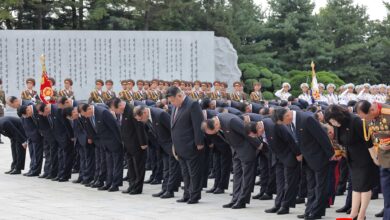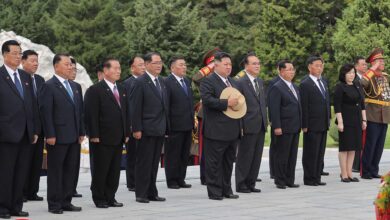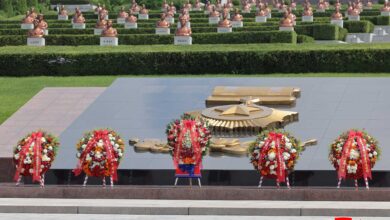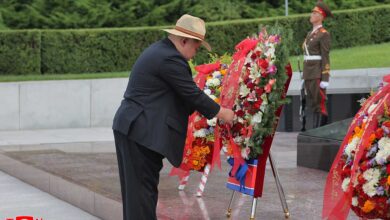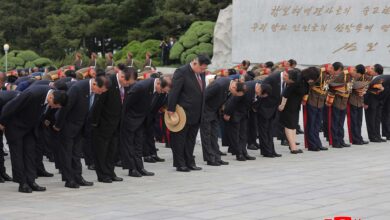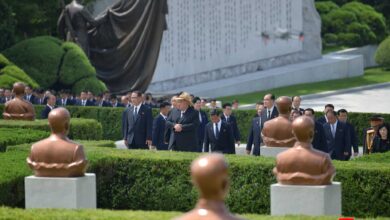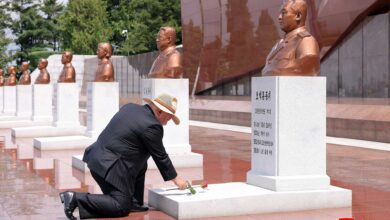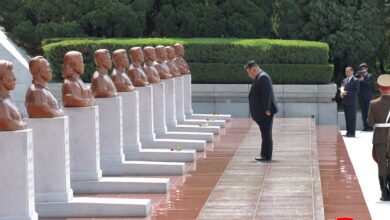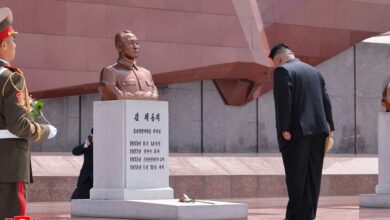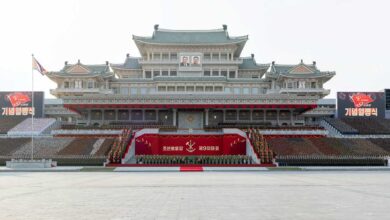The whole country celebrating with splendour the significant liberation day is filled with boundless reverence for the anti-Japanese revolutionary forerunners who consolidated the cornerstone for the eternal prosperity of our powerful state by smashing the imperialist tyranny by dint of the revolutionary spirit of Paektu and accomplishing the cause of winning independence by the country’s own efforts.
Kim Jong Un, general secretary of the Workers’ Party of Korea and president of the State Affairs of the Democratic People’s Republic of Korea, visited the Revolutionary Martyrs Cemetery on Mt Taesong on August 14 on the occasion of the 80th anniversary of Korea’s liberation.
Present there were Pak Thae Song and Jo Yong Won, members of the Presidium of the Political Bureau of the Central Committee of the WPK, and other senior Party and government officials, chief secretaries of provincial committees of the WPK, Party and administrative officials of commissions and ministries and commanding officers of armed forces organs.
The guard of honour of the Korean People’s Army lined up at the Revolutionary Martyrs Cemetery.
The national anthem of the DPRK was played solemnly.
Amid the playing of the wreath-laying music, a wreath bearing the name of Kim Jong Un was laid before the wreath-laying stand of the cemetery.
Also laid were wreaths in the name of the WPK Central Committee, the State Affairs Commission of the DPRK, the Standing Committee of the Supreme People’s Assembly of the DPRK and the Cabinet of the DPRK.
Kim Jong Un, together with all the participants, observed a moment’s silence in memory of the revolutionary martyrs who devoted their lives to the sacred cause for the liberation of the country, the defending of its sovereignty, the freedom of its people and the happiness of all the generations to come.
There was a march-past of the guard of honour of the Korean People’s Army.
Kim Jong Un went round the revolutionary martyrs cemetery together with the participants.
He laid flowers before the busts of O Jin U, O Paek Ryong, Kim Il, Choe Chun Guk, Kang Kon, Kim Chaek, An Kil, Ryu Kyong Su, Choe Hyon and Rim Chun Chu, recollecting with reverence the immortal feats and worthwhile life of the first generation of the revolution, who courageously turned out in the anti-Japanese war with a staunch spirit and ardent patriotism and achieved the independence of the country at the cost of their blood.
He said that national liberation, the first precious gain of the sacred Korean revolution started on the strength of arms, was the victory of President Kim Il Sung’s original idea of winning national independence and sovereignty and his sacred leadership practice covering 20 years, as well as the victory of the heroic struggle of the pioneering generation of the Korean revolution, who waged death-defying resistance with the firm faith that they would surely liberate the country as long as they were led by Kim Il Sung.
The history of the anti-Japanese war is so sacred as every bloody battle was associated with the spiritual world of revolutionary comradeship that cannot be bartered for anything else and the indomitable struggle spirit to beat the enemy even though one may die a thousand times, he said, adding that the fighters who created the great spirit of Mt Paektu and the revolutionary traditions of Paektu to be handed down through generations are genuine revolutionaries and models of true patriots whom all the generations to come should remember and learn from.
Confirming that our state will prosper forever as the world’s most powerful country on the eternal foundations of victory and glory consolidated by the first generation of the revolution, Kim Jong Un sincerely wished that the noble soul and spirit of the fighters will be immortal along with the red flag of the revolution.
Under the wise leadership of the respected Comrade Kim Jong Un, symbolic of the absolute strength and great dignity of our powerful socialist state, the Korean people will glorify the history and tradition of sure victory generation after generation and accomplish the revolutionary cause of Juche.
KCNA

